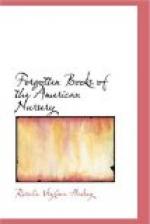Such was the assortment of penny-dreadfuls and religious tracts offered in seventeen hundred and eighty-one to the Philadelphia public for juvenile reading. It is typical of the chapmen’s library peddled about the colonies long after they had become states. “Valentine and Orson,” “The Seven Wise Masters,” “The Seven Wise Mistresses,” and “Winter Evening Entertainment” are found in publishers’ lists for many years, and, in spite of frequent vulgarities, there was often no discrimination between them and Newbery’s far superior stories; but by eighteen hundred and thirty almost all of these undesirable reprints had disappeared, being buried under the quantities of Sunday-school tales held in high favor at that date.
Meanwhile, the six years of struggle for liberty had rendered the necessaries of life in many cases luxuries. As early as seventeen hundred and seventy-five, during the siege of Boston, provisions and articles of dress had reached such prices that we find thrifty Mrs. John Adams, in Braintree, Massachusetts, foreseeing a worse condition, writing her husband, who was one of the Council assembled in Philadelphia, to send her, if possible, six thousand pins, even if they should cost five pounds. Prices continued to rise and currency to depreciate. In seventeen hundred and seventy-nine Mrs. Adams reported in her letters to her husband that potatoes were ten dollars a bushel, and writing-paper brought the same price per pound.
Yet family life went on in spite of these increasing difficulties. The diaries and letters of such remarkable women as the patriotic Abigail Adams, the Quakeress, Mrs. Eliza Drinker, the letters of the Loyalist and exile, James Murray, the correspondence of Eliza Pinckney of Charleston, and the reminiscences of a Whig family who were obliged to leave New York upon the occupation of the town by British forces, abound in those details of domestic life that give a many sided picture. Joys derived from good news of dear ones, and family reunions; anxieties occasioned by illness, or the armies’ depredations; courageous efforts on the part of mothers not to allow their children’s education and occupations to suffer unnecessarily; tragedies of death and ruined homes—all are recorded with a “particularity” for which we are now grateful to the writers.
It is through these writings, also, that we are allowed glimpses of the enthusiasm for the cause of Liberty, or King, which was imbibed from the parents by the smallest children. On the Whig side, patriotic mothers in New England filled their sons with zeal for the cause of freedom and with hatred of the tyranny of the Crown; while in the more southern colonies the partisanship of the little ones was no less intense. “From the constant topic of the present conversation,” wrote the Rev. John J. Zubly (a Swiss clergyman settled in South Carolina and Georgia), in an address to the Earl of Dartmouth in seventeen hundred and seventy-five,—“from




